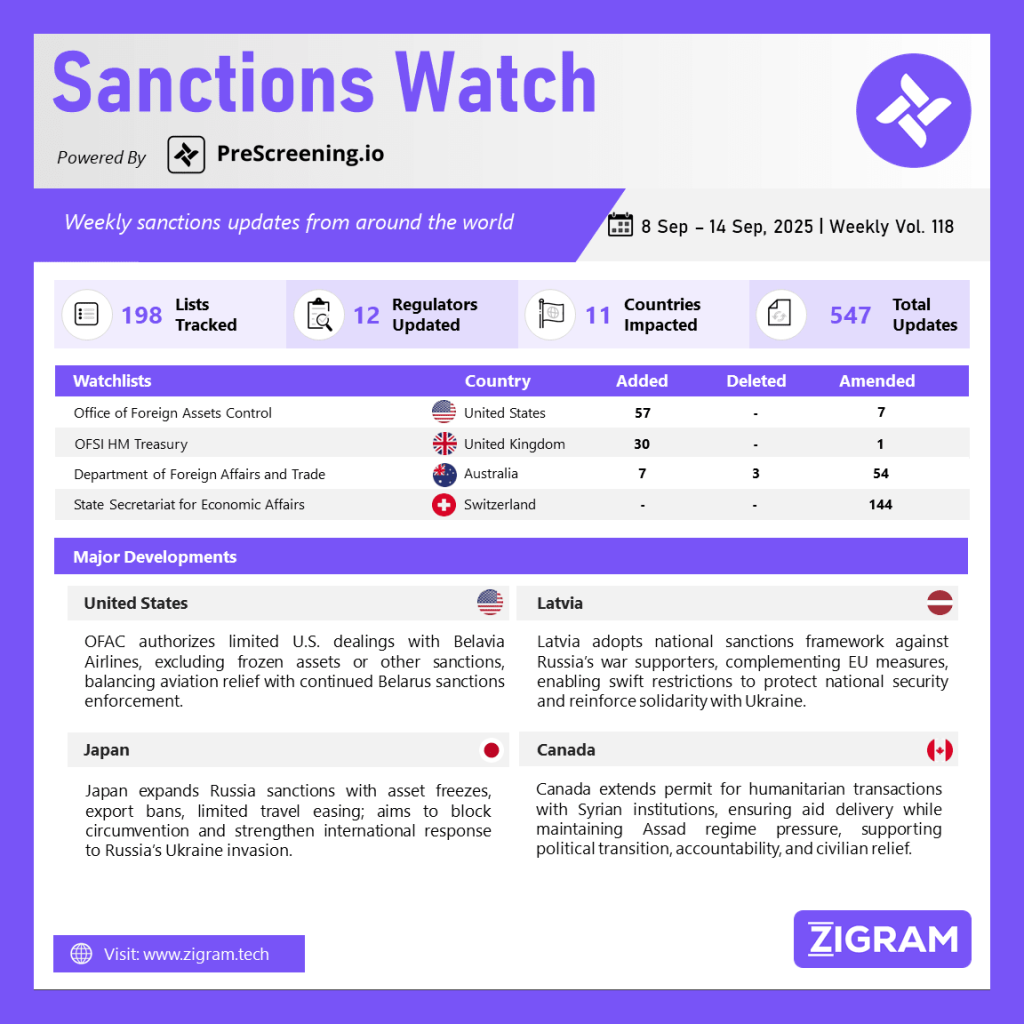Sanctions Watch Vol 118
In the latest edition of our Sanctions Watch weekly digest, we present significant updates on sanction watchlists and regulatory developments.
1. U.S. Treasury Issues General License Allowing Certain Transactions with Belavia Belarusian Airlines
The U.S. Department of the Treasury’s Office of Foreign Assets Control (OFAC) issued General License No. 11 under the Belarus Sanctions Regulations (31 CFR part 548). The license authorizes U.S. persons to engage in transactions involving Open Joint Stock Company Belavia Belarusian Airlines (Belavia), including any entity in which Belavia directly or indirectly holds a 50 percent or greater interest.
This authorization provides a temporary allowance for dealings that would otherwise be prohibited due to sanctions against Belarus. However, OFAC clarified that the license does not permit the unblocking of any previously frozen property, nor does it authorize dealings with other sanctioned individuals or entities under the Belarus Sanctions Regulations unless specifically covered.
The license also does not exempt compliance with other U.S. laws, including the International Traffic in Arms Regulations (ITAR) and the Export Administration Regulations (EAR). As such, parties engaging in authorized transactions must remain vigilant regarding overlapping regulatory obligations.
The move reflects a targeted approach by OFAC, providing limited relief while maintaining broader sanctions pressure on Belarus. This license may support aviation-related operations and essential services while ensuring that enforcement of sanctions remains intact.
2. Latvia Adopts National Sanctions Regulations in Response to Russian Aggression Against Ukraine
The Latvian Cabinet of Ministers adopted new national sanctions regulations aimed at countering security threats posed by Russia’s ongoing aggression against Ukraine. The regulations, published in the official gazette Latvijas Vēstnesis, establish a framework allowing Latvia to impose sanctions on individuals, entities, and companies that directly or indirectly support Russia’s war efforts.
The sanctions apply to those who undermine Ukraine’s territorial integrity, sovereignty, independence, and stability, as well as entities providing financial or material support to Russian military actions. This includes companies doing business with separatist groups or acting as intermediaries for Russia’s revenue streams.
Latvia’s move complements the EU’s collective sanctions, which since 2022 have targeted more than 2,500 individuals and entities. While the EU has adopted multiple sanction packages, Latvia’s regulation provides national-level flexibility, enabling rapid restrictions on specific persons or sectors based on domestic security assessments.
The Ministry of Foreign Affairs emphasized that the sanctions are a defensive measure to protect Latvia’s national security, reflecting its solidarity with Ukraine. The Cabinet retains authority to expand the list of designated persons and apply restrictions on financial transactions and access to resources.
By introducing its own national sanctions framework, Latvia strengthens its ability to respond independently to evolving geopolitical risks while supporting international efforts to isolate Russia economically and diplomatically.
3. Japan Expands Sanctions against Russia over Ukraine Invasion
Japan announced a new round of sanctions targeting Russia in response to its invasion of Ukraine. The expanded measures include an asset freeze on 51 organizations and 14 individuals tied to Russia, and an export ban to 11 organizations located in countries including Russia, China, and Turkey.
In a notable adjustment, Japan’s Foreign Ministry also relaxed some travel restrictions for Japanese nationals wishing to visit or stay in Russia for purposes such as business, study, or research—but only when there is a compelling reason. This easing does not apply to border regions near Ukraine, which remain under the strictest travel advisory (Level 4, evacuation urged).
The government said that these expanded sanctions aim to bolster international efforts to address issues stemming from Russia’s war in Ukraine, including preventing sanction circumvention through third countries.
4. Canada Extends Measures Allowing Humanitarian Transactions in Syria
Canada’s Minister of Foreign Affairs announced the six-month extension of a General Permit that temporarily relaxes certain restrictions under the Special Economic Measures (Syria) Regulations. The extension enables Canadians and persons in Canada—including the Syrian diaspora, non-profits, civil society groups, and charitable organizations—to conduct humanitarian-related transactions with sanctioned Syrian institutions, such as the Central Bank of Syria.
This measure ensures that critical humanitarian and stabilization assistance continues to reach Syrians during an important phase of political transition. After decades of authoritarian rule and over 13 years of conflict, most Syrians now live below the poverty line, with millions reliant on aid. By allowing humanitarian transactions otherwise prohibited by sanctions, Canada seeks to ease the operational challenges faced by organizations delivering assistance on the ground.
Canada’s approach balances strict sanctions—currently targeting 225 Syrian individuals and 56 entities tied to the Assad regime—with humanitarian flexibility. Since 2015, Canada has resettled over 100,000 Syrian refugees and committed more than $4.7 billion to Syria and refugee-hosting countries, including Iraq, Jordan, and Lebanon. This funding covers humanitarian relief, development, and stabilization programs.
The extension also reinforces Canada’s broader policy of supporting an inclusive and peaceful political transition in Syria. Concurrently, Canada remains committed to accountability measures, including its ongoing case before the International Court of Justice against Syria for systematic torture and human rights abuses.
This decision reflects Canada’s dual commitment: maintaining pressure on the Assad regime while ensuring that ordinary Syrians continue receiving vital humanitarian support.
Know more about the product: PreScreening.io
Click here to book a free demo.
Sanctions Watch is a weekly recap of events and news related to sanctions around the world.
- #OFAC
- #Sanctions
- #Belarus
- #BelaviaAirlines
- #RussiaUkraineWar
- #LatviaSanctions
- #JapanSanctions
- #CanadaSanctions
- #HumanitarianAid
- #Geopolitics

